
Prospettive di sviluppo per le aree rurali della Campania
cod. 364.101

Prospettive di sviluppo per le aree rurali della Campania
cod. 364.101
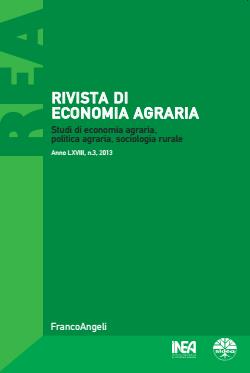
Within the scope of the last two stages of rural development programming, the Campania Region has introduced significant innovations in the field of integrated intervention strategies in rural areas by implementing an Integrated Rural Project (IRP). This programme led to a new organizational model for public intervention in rural areas. This key it has given the opportunity of trying out participatory/integrated development processes in rural areas (Leader method) which have now become an integral part of routine programming (Leader Axes and Collective Action Projects 2007-2013), through the management of integrated rural development policies by local partnerships. The strategic mission of IRPs has been that of intervening, by means of a partnership approach, in the main issues which limit competitive capacity within regional rural areas. The IRPs act as models for collective and integrated action for programmed intervention on a territorial basis. Their dual aim is to endorse a system of local governance and to promote integration and coordination between rural development policy and other policies. In light of what has been stated above, this paper aims to develop an impact assessment of integrated rural policy in the Campania region with the objective of evaluating: the overall levels of efficiency reached compared to ‘traditional’ programming models; the ‘quality’ of negotiation processes and of the new relationship networks which derive from them; models and best practices, in terms of financial/implementation efficiency and programmatic effectiveness, with a view to their transfer into the 2014-2020 programming period; the effective possibility that the model represents a concrete and effective opportunity for the promotion of selfgovernance on an intra-regional scale. Each of these elements has allowed us to evaluate the effectiveness of the method on a territorial level and, consequently, the impact on the enhancement of the overall efficiency and effectiveness of locally implemented rural development strategies, on the reconfiguration of the local governance system and, more generally, on the involvement of rural communities in development processes. The methodological framework took the regional administrative databases as a starting point and carried out qualitative investigation through focus groups (constituted in each territorial reference environment of the 15 regional IRPs), made up of members of the local partnerships and beneficiaries of the Programme who were requested to express their opinion with regard to specific topics of discussion. The results of this study have allowed us to gain useful insights into the efficiency of expenditure and the effectiveness of rural development policies in terms of territorial readjustment and socio-economic impact. In the context of the present-day crisis, such results provide useful consideration for worthwhile scientific debate together with normative guidance for decision makers with a view to the next stage of rural development programming (2014-2020).
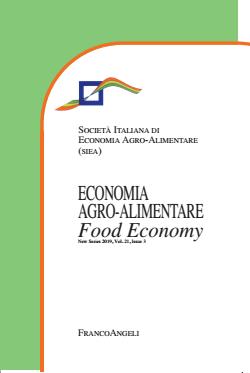
The attention to business networks, therefore to the business relationships among companies, supply chain operators, manufacturers and consumers, aimed at commercial transactions, exchange of information, sharing of norms and associations of resources become an asset in the definition of modern strategies of competitive advantage for agribusiness companies. In this perspective, the short chain represents an interesting business model network, rooted in the specific territorial context, which, through specific organizational characteristics and diversified multi-functional activities, is enhanced by human and social resources, internal and external (at the company), and able to act on the local aggregation process and territorial value creation. Share capital and human capital become, therefore, the determining factors for the effectiveness of the short food supply chain experiences, especially in the inland areas, and for wider dissemination and sharing of the value created. Aim of this work is an analysis of the functional relationships between social capital and human capital in farms, diversified and multifunctional, which have taken paths of short chain. For this purpose, the empirical verification aimed to investigate how the quality of human capital affects the effectiveness of relational networks and how it could lead to have impacts on the performance of short chain, improving its ability to create value for the enterprise and for the territory. The results of the study made possible to understand the mechanisms and the strategic variables of this innovative mode of direct governance of transactions between producer and consumer-citizen, in specific territorial rural systems, and to indicate useful policy implications.

La creazione di valore e stata oggetto di significativa attenzione nel dibattito economico- agrario, nazionale e internazionale, degli ultimi anni, portando allo sviluppo di nuovi approcci teorici che hanno permesso di reinterpretare i processi di riposizionamento funzionale dell’impresa agricola (multifunzionale). In quest’ottica, percio, la multifunzionalita permette all’azienda di rispondere alle nuove istanze sociali, consapevoli e responsabili, produrre benessere collettivo, integrare il reddito, individuare percorsi di creazione di valore socialmente responsabile. In questo senso, si rinnova la tradizionale visione della multifunzionalita, la quale da strumento di giustificazione dell’intervento pubblico in agricoltura assume valore di vero e proprio fattore strategico di vantaggio competitivo. Il paper propone un modello teorico che consente di analizzare come i processi di boundary shift portino alla creazione di un "portafoglio di valori" (PV) (Marotta, Nazzaro, 2010; 2011a, 2011b), e a nuovi modelli di impresa agricola multifunzionale e multi-valore. Sul piano metodologico, l’utilizzo della Value Portfolio and Multifunctional Governance Analysis (VPMGA) (Marotta, Nazzaro, 2010; 2011a, 2011b), ha permesso di validare empiricamente il modello del PV, in specifiche filiere agroalimentari e sistemi rurali della Campania, secondo un approccio che, integrando e completando la value chain analysis e la governance value analysis, si pone come innovativo e meglio rappresentativo delle specificita dell’impresa agricola multifunzionale. I risultati hanno permesso di verificare come il boundary shift e, quindi, il PV, consentono di diversificare il rischio, in situazioni di crisi, rappresentando una strategia competitiva per le imprese multifunzionali rispetto alle imprese che conservano il solo core business tradizionale.

Agri-food enterprises are rethinking their traditional economic, productive and organizational schemes based on the new sustainability models. In the light of the new value creation patterns these enterprises are also reshaping their relationships with the other agri-food stakeholders by adopting socially responsible behaviour. In this widely changed but still evolving context, agri-food enterprises have therefore been demonstrating socially responsible attitudes towards the common good and social welfare leading to a new business ethical dimension, known as social responsibility. A new vision of agri-food enterprises is therefore established. In fact, they are reconsidered as a set of tangible and intangible value chains and their related governance structures, the composition and extent there of being determined by specific groups of variables which create an "optimal value portfolio". In the light of this analytical perspectives, the aim of this paper is to contribute to the theoretical agricultural economic debate and analyse social responsibility as a sustainability strategy and value creation means for agri-food enterprises and as a competitive factor within developed economies. Hence the theoretical-methodological approach of this paper has defined new interpretation models of sustainable agri-food enterprises and their related strategic behaviour which is ethically driven and adopted for value creation purposes in the light of the current social, economic, environmental and territorial issues. The theoretical and methodological results thus provide a further development in the analysis of value creation models in agri-food systems by opening new research avenues. Moreover, they also offer new insights for policy makers and practitioners as they contribute to the debate on the role of policies to support enterprises’ socially responsible actions and the definition of new guidelines for agri-food system actors.
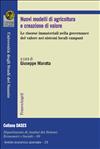
Le risorse immateriali nella governance del valore nei sistemi locali campani
un’analisi dei nuovi modelli di agricoltura e dei processi di creazione di valore nell’azienda agricola multifunzionale, alla luce degli attuali e complessi scenari competitivi e politico-istituzionali.
cod. 365.939

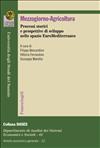
Processi storici e prospettive di sviluppo nello spazio EuroMediterraneo
Il tema Mezzogiorno-Agricoltura viene qui interpretato alla luce del nuovo scenario Euro-Mediterraneo, con un approccio multidisciplinare che accoglie i contributi di geografi, storici economici ed economisti agrari, al fine di stimolare riflessioni sulle possibili strategie di riposizionamento del Mezzogiorno d’Italia, a fronte di nuove opportunità ma anche di possibili minacce.
cod. 365.919
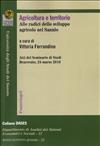
Alle radici dello sviluppo agricolo nel Sannio. Atti del Seminario di Studi Benevento, 24 marzo 2010
Il volume presenta gli Atti di un seminario di studi sullo sviluppo agrario del Sannio, indagando con un approccio interdisciplinare, che tiene conto sia della qualità del paesaggio che delle informazioni di archivio, quegli aspetti che hanno trasformato e segnato il paesaggio delle aree rurali con tratti inconfondibili.
cod. 365.843
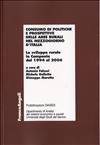
Lo sviluppo rurale in Campania dal 1994 al 2006
Un importante strumento per quanti sono interessati alle politiche per lo sviluppo rurale. I risultati emersi dalle indagini costituiscono un quadro conoscitivo di riferimento per gli attori istituzionali, nell’ambito del miglioramento degli assetti organizzativi e dei contenuti delle politiche, in vista dell’attuazione della nuova fase di programmazione dello sviluppo rurale (2007-2013).
cod. 365.603
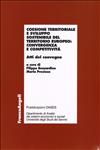
Alcune riflessioni sul tema dell’integrazione e della convergenza delle scelte comunitarie in ambito di occupazione, ambiente e sviluppo sostenibile, competitività delle imprese e dei territori, formazione e capitale umano, sviluppo delle nuove tecnologie dell’informazione e della conoscenza.
cod. 365.558

Metodologie di analisi e assetti organizzativi in Campania
cod. 365.427

Il sistema di gestione e controllo in Campania
cod. 365.402

Prospettive e modelli di sviluppo per le imprese italiane
cod. 365.364

Filiere e territori
cod. 365.391

Analisi dell'impatto in Campania
cod. 365.379

Il modello organizzativo della regione Campania
cod. 365.382
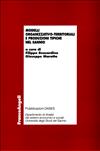
cod. 365.231

The rural development, in the last years, has become one of the central themes of the political economic debate in EU. A remarkable contribution, on this issue, was made by the European Commission with the publication, in the 1988, of the document on The Future of the Rural World. In this document it is possible to find the foundations of the new Common Policy for the rural development that has been defining in the course of the last decade. One of the innovative elements has represented by the integrated development approach, based on a valorisation of the endogenous resources. In other words, the EU rural development policy is inspired to a model of endogenous and flexible development to gather and to valorise the differences of the social-economic and territorial environments of the Union. According to this formulation, the development process in a local context, although could not avoid a restructuring of the agricultural sector, can orient itself in environmental sense, agri-turistic, agri-handicraft, agri-naturalistic, etc., to valorise the quality and potentiality of the endogenous resources. In this modern approach of the rural development, the typical productions become particularly important. Where it is possible, in fact, the valorisation of the typical productions could represent a good tool for the local development. The EU Commission in his document affirmed: "the maintenance and the promotion of quality products could constitute an important element (of development) above all in the disadvantaged or isolated areas"6. Many empirical analysis have, however, underlined that the typical productions valorisation requires an organisational structure and a modern entrepreneurial culture of which, almost always, the rural areas result particularly poor. That makes the binomial "Rural Development - Typical Productions" rather complex and problematic to change and become a concrete and effective development factor.